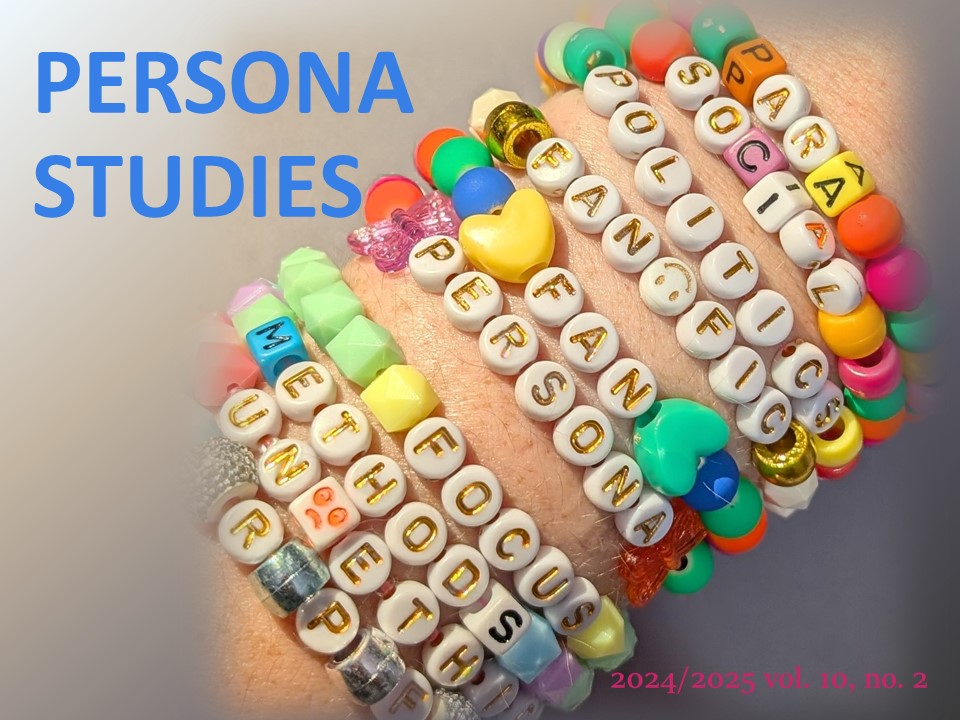“One of the most prolific smut writers on Tumblr”
Contested Fan Practices and the Continuum of Fan Personas
DOI:
https://doi.org/10.21153/psj2024vol10no2art2071Keywords:
Fannish Behaviour and Practice, Contested Fandoms, Conflicting Fandoms, Celebrity Fandom, Real Person FanfictionAbstract
Most fanfiction writers never imagine the worlds they create could become television content. However, many were confronted with this possibility in the third episode of HBO’s Euphoria (2019). Kat Hernandez, a social outcast, became a well-known writer on Tumblr for her fanfiction about Harry Styles and Louis Tomlinson from One Direction. Her story, "The First Night," was brought to life through an explicit one-minute technicolour animation. This article examines the reactions to both the animation and the specific fan practice of Real Person Fanfiction (RPF) highlighted by the episode. By analysing the reactions of three groups—One Direction fans, subscribers to the "Larry Stylinson" narrative, and non-One Direction fanfiction writers—this article demonstrates how fans perform contested fan practices and (attempt to) mediate which aspects are visible to the mainstream and other fans through specific fan personas. Drawing on scholars like Christopher Moore, Mark Stewart, CarrieLynn D. Reinhard, Celia Lam and Jackie Raphael, this article investigates how idealized fan performances, often weaponized against fandom by mainstream culture, are also used internally to regulate behaviour.
Downloads
References
Asquith, D 2016, ‘Crazy About One Direction: Whose Shame Is It Anyway?,’ in L Bennett & P Booth (eds.), Seeing Fans: Representations of Fandom in Media and Popular Culture, Bloomsbury Academic, New York, pp. 79–88.
Barbour, K 2015, ‘Registers of Performance: Negotiating the Professional, Personal and Intimate in Online Persona Creation,’ in E Thorsen, H Savigny, J Alexander, and D Jackson (eds.), Media, Margins and Popular Culture, Palgrave Macmillan, London, pp. 57–69.
Barner, AJ 2017, The Case for Fanfiction: Exploring the Pleasures and Practices of a Maligned Craft, McFarland & Company, Jefferson.
Booth, PJ 2015, ‘Fandom: The Classroom of the Future,’ Transformative Works and Culture, no. 19, <https://doi.org/10.3983/twc.2015.0650>
Busse, K 2017, Framing Fan Fiction: Literary and Social Practices in Fan Fiction Communities, University of Iowa Press, Iowa City.
Califia, P 2000, Public Sex: The Culture of Radical Sex, 2nd edn, Cleis Press, San Francisco.
Coleman, R & Lyons, A 2024, ‘Stereotypes in media representations of boy bands and their fans’, Journalism, vol. 25, no. 8, pp. 1717-1735, <https://doi.org/10.1177/14648849231183812>
Duffet, M 2013, Understanding Fandom: An Introduction to the Study of Media Fan Culture, Bloomsbury Academic New York.
Dyer, R. 2004, Heavenly Bodies: Film stars and Society, Routledge, Abingdon.
Dym, B and Fiesler, A 2020, ‘Social Norm Vulnerability and its Consequences for Privacy and Safety in an Online Community’, Proceedings of the ACM on Human-Computer Interaction, vol. 4, no. CSCW2, pp.155:1-155:24, <https://doi.org/10.1145/3415226>
Euphoria 2019, ‘03 Bonnie and Clyde’, TV, HBO, Jul 14.
Euphoria 2019, ‘Made You Look’, TV, HBO, Jun 30.
Ewens, H 2020, Fangirls: Scenes from Modern Music Culture, University of Texas Press, Austin.
Fanfiction.net 2008, FanFiction Content Guidelines, Fanfiction.net, retrieved 3 December 2024, <https://www.fanfiction.net/guidelines>
Gonzales, V M 2016, ‘Swan Queen, Shipping, and Boundary Regulation in Fandom,’ Transformative Works and Cultures, no. 22, <https://doi.org/10.3983/twc.2016.0669>
Jensen, J 1992, ‘Fandom as Pathology: The Consequences of Characterization,’ in L A Lewis (ed.), The Adoring Audience: Fan Culture and Popular Media, Routledge, London, pp. 9–29.
Lam, C & Raphael, J 2022, Celebrity Bromances: Constructing, Interpreting and Utilising Personas, Routledge, New York.
Lam, C, J Raphael, R Middlemost and J Balanzategui 2022, ‘Introduction,’ in Fame and Fandom: Functioning on and Offline, University of Iowa Press, Iowa City, pp. 1–10.
Larsen, K & Zubernis, L S 2012, Fandom at the Crossroads: Celebration, Shame and Fan/Producer Relationships, Cambridge Scholars, Newcastle upon Tyne.
McCain, K 2021, ‘The Journey to Flavortown: Guy Fieri, Relatability and Transformative Fandom,’ in EL Newman and E Witsell (eds.), The Food Network Recipe: Essays on Cooking, Celebrity and Competition, McFarland, Jefferson, pp. 20-35.
Moore, C, K Barbour and K Lee 2017, ‘Five Dimensions of Online Persona,’ Persona Studies, vol. 3 no. 1, <https://doi.org/10.21153/ps2017vol3no1art658>
Moore, CL 2020, ‘An Approach to Online Fan Persona,’ Transformative Works and Cultures, no. 33, <https://doi.org/10.3983/twc.2020.1703>
Pope, JH 2019, Shakespeare’s Fans: Adapting the Bard in the Age of Media Fandom, Palgrave, Cham.
Primus, S 2022, ‘Euphoria’ Is a Realistic Depiction of the Struggles of Young Adults, Hornet Newspaper, retrieved 3 December 2024, <https://thehornetonline.com/2022/03/10/euphoria-is-a-realistic-depiction-of-the-struggles-of-young-adults/>.
Proctor, W 2016, ‘A New Breed of Fan?: Regimes of Truth, One Direction Fans, and Representations of Enfreakment,’ in L Bennett & P Booth (eds.), Seeing Fans: Representations of Fandom in Media and Popular Culture, Bloomsbury, London, pp. 67–78.
Reinhard, CD 2018, Fractured Fandoms: Contentious Communication in Fan Communities, Lexington Books, Lanham.
Scott, S 2019, Fake Geek Girls: Fandom, Gender, and the Convergence Culture Industry, New York University Press, New York.
Seitz, MZ 2019, Why Euphoria Feels so Real, Even When it isn’t Realistic, Backstories, Vulture, retrieved 3 December 2024, www.vulture.com/2019/08/euphoria-sam-levinson-filmmaking-influences.html.
Stanfill, M 2019, Exploiting Fandom: How the Media Industry Seeks to Manipulate Fans, University of Iowa Press, Iowa City.
Stewart, M 2023, ‘Towards a Theory of “Appropriate Fandom,”’ Participations, vol. 19 no. 2, pp. 165–182, retrieved 3 December 2024, https://www.participations.org/19-02-09-stewart.pdf.
Tang, JL 2023, ‘Shipping on the edge: Negotiations of precariousness in a Chinese real-person shipping fandom community’, International Journal of Cultural Studies, vol. 26 no. 3, pp. 293-309, https://doi.org/10.1177/13678779231159148
Thomas, B 2014, ‘Fans Behaving Badly? Real Person Fic and the Blurring of the Boundaries Between the Public and the Private,’ in B Thomas & J Round (eds.), Real Lives, Celebrity Stories: Narratives of Ordinary and Extraordinary People Across Media, Bloomsbury, London, pp. 171–186.
Tiffany, K 2022, Everything I Need I Get from You: How Fangirls Created the Internet as We Know It, Macmillan, New York.
Yodovich, N 2021, ‘Defining Conditional Belonging: The Case of Female Science Fiction Fans’, Sociology, vol. 55, no. 5, pp. 871-887, https://doi.org/10.1177/0038038520949848
Zhang, M 2021, ‘‘‘Keep the fantasy within a circle’: Kai Wang and the paradoxical practices of Chinese real person slash fans,” Celebrity Studies, vol. 12 no. 2, pp. 346-351, https://doi.org/10.1080/19392397.2020.1765074
Downloads
Published
Issue
Section
License
Copyright (c) 2025 Khaliah Reed

This work is licensed under a Creative Commons Attribution-NonCommercial 4.0 International License.







